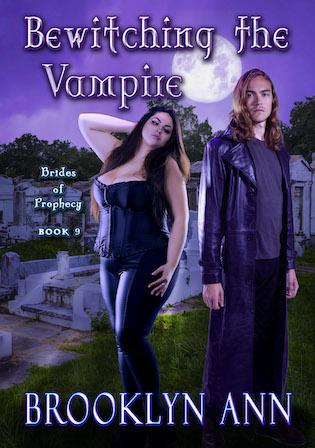
Bewitching the Vampire
Goodreads / Amazon / Barnes & Noble / iBooks / Kobo / Google Play -- EXCERPT: The sun had set by the time they left the restaurant. Raina groaned to see Valentin leaning against her car. “Did you even have time to feed?” The vampire smirked and put his hand over his heart. “I’m touched that you care.” “I just want to make sure that you aren’t planning on biting one of us.” “And now you wound me.” Valentin gave her an unfairly sexy pout. “Ms. Callahan, I told you that your safety is of utmost importance to me. Now, may I have a ride, or will you make me walk?” “Can’t you fly?” His laughter held the texture of roughened velvet. “That is a rare ability with my kind.” Raina wanted to ask more about what he could do but held her face in an impassive mask. “I guess you’ll have to take an Uber, then.” With that, she and Alma got in her little Nissan Leaf and drove home. But when they pulled into the narrow driveway, Valentin was waiting on the curb, just outside the protective wards. Raina glared at him as she got out of the car, noting that he remained outside the barrier. “I thought you couldn’t fly.” “I can’t.” “Did you turn into a bat then?” Alma asked him. “Or teleport?” “I have my ways.” Valentin stood and dusted off his jeans. “You may as well invite me in.” “Hell no,” Raina said as she shut her car door. “I’ve seen enough movies.” The vampire laughed. “I don’t need an invitation to go inside your house. I’ve been in there before. You both have interesting taste in art. I especially like the movie posters. I’d just appreciate it if you to let down your ward.” “No.” His pout twisted things beneath her ribs. “I am tired of being outside.” “Then go home.” “You know I can’t do that.” Raina threw up her hands in exasperation, and she and Alma went into the house. They tried to ignore the fact that a vampire was lurking outside and watch a movie, but ended up turning it off and going to bed early. Despite her exhaustion, Raina tossed and turned for an hour, countless questions burning in her mind. She gave up on sleep, put on her robe, and went outside. Valentin was still sitting on the curb, reading a book. He looked up with a smirk. “I’m glad you’re here to alleviate my boredom.” “Who is Xochitl’s uncle?” Raina demanded, marching up to him. Valentin’s eyes widened, and he visibly shuddered. “Probably one of the most terrifying beings in existence. I don’t know how much I’m allowed to tell you about him.” He sighed. “I honestly am sorry. I hate all these unknowns and uncertainties.” “Me too.” She thought of her own concerns with the Nightwatch Society visitor and Xochitl’s email that gave her more questions than answers. Remembering the email, she found herself blurting, “Xochitl said you were watching me during the backstage meet and greet back in February. She said you looked like you wanted to eat me. What did she mean by that?” The vampire’s lips curved in a wicked smile. “Exactly that.” “But what—” Suddenly, he stood behind her. Too late, she realized she’d stepped passed the protective barrier. Valentin’s fingertips swept her hair to the side, and his lips grazed her neck as he whispered, “If you’re asking if I want to sink my teeth into your pretty neck and taste your powerful blood, the answer is yes.” Before she could respond, he appeared in front of her, his green eyes glowing like dark emeralds. “Or, if you’re asking if I want to part your luscious thighs and plunge my tongue into your plump pussy until you scream my name in pleasure, the answer is also yes.” Raina shivered uncontrollably as the mental picture he painted sent frissons of arousal jolting between her legs. “Of course, I will not do either unless you ask me to,” he finished while his eyes continued to blaze emerald flame. Finally, her faculties recovered enough for her to pull away and step back into the safety of her barrier. “Just because I’m fat doesn’t mean I have low enough self-esteem to fall for your attempts to flatter me.” Valentin’s eyes hardened. “Just because society often lauds thinner women as paragons of beauty doesn’t mean I have to change my own personal tastes. Nor does it make you any less beautiful. Furthermore, I’ve never felt the need to feign attraction to someone. My flirtations are sincere. It’s one thing if my advances aren’t welcome, but quite another if you think I’m a liar.” 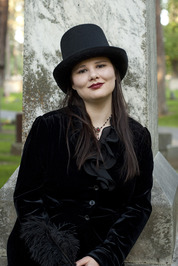
GIVEAWAY! #Book Blitz #Lifestyle (Trust Fall 1) by Kasey Fallon #Contemporary Romance @Xpresso Book Tours24/7/2023
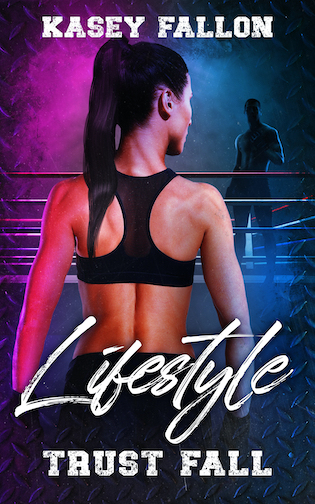
Lifestyle
-- EXCERPT: He wasn’t sure what to expect from Lexi’s hangover, but he hadn’t expected waking up to an empty bed. After adding a t-shirt to his lounge pants, he shuffled into the kitchen. No Lexi, but the coffeemaker had been turned on, and one mug had appeared in his dish rack. If it weren’t for her little duffel bag on the floor of his bedroom he would have thought she’d left. He was reaching for a mug when the note caught his attention. A paper towel had been laid flat, and the word run was looped in some kind of blue goop. Hair gel was his first thought, but as he picked it up he caught the scent. It was written in his dish soap. With a chuckle he pitched into the trash can. Since he wasn’t sure when she would be back and didn’t want to leave the apartment open, he settled for a quick workout in his living room. The scent of sausage was heavy through the kitchen by the time she came in, panting. Lexi didn’t say a word to him but passed him to stand at the sink. She turned the cold water on full and stuck her wrists under the spray. Grayson frowned. “How far did you go? You’re fighting tonight, today is supposed to be a rest day for you.” With her face flushed, she looked over her shoulder at him. It completed the look for him; flushed face, sports bra, and bike shorts that left little to the imagination, bent over in front of him. His mind immediately took a detour into being behind her in a different way. With her hair loose- “I only went like two miles, most of it walking, that was why I took so long. Quick sprint at the end.” She turned off the tap and dried her hands on a dish towel. He brought his imagination to heel and focused on the fact that she seemed comfortable in his place. He hadn’t been sure it was the right move, bringing her back here drunk; they hadn’t talked about it. He shifted the sausage in the pan as the sizzling brought his attention back to the stove. “So it’s okay that I brought you back here?” he asked. “Yeah, it’s fine. I mean I’m yours now, right?” Laughing dark eyes looked up at his, and though she spoke lightly, the statement hit him hard. Then she was talking again before he had time to think of a response. “And it’s definitely okay if I’m getting breakfast,” she said with a smile. “Good,” he said gruffly. “How do you like your eggs?” He had to force the words through the sudden tightness in his chest. She was his. But was she really? “I can make them,” she offered, and he shook his head. “Go stretch while you’re still warmed up.” “I don’t mind-” Lexi stopped mid-sentence when he turned and pinned her with a stare. She snapped her mouth closed with an audible snap, and stomped past him towards the living room. He smirked as he heard the music from her phone blast down the hall. Good girl. 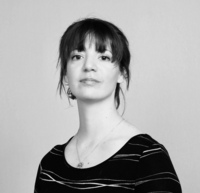
GIVEAWAY! 
Take the Honey and Run
Goodreads / Amazon / Barnes & Noble / iBooks / Kobo / Google Play -- EXCERPT: She couldn’t seem to catch her breath. “Like dead-dead?” she whispered, trying to keep her anxiety in check and not hyperventilate. Sawyer arched an eyebrow. “Yes, Bailey. Like that.” Her hands fluttered to her mouth as she slumped to the floor next to Werner. Praying he was wrong, she picked up Werner’s hand, just as Sawyer had done to her the day before and tried desperately to find the flutter of a beat. “Just breathe, Bailey,” Sawyer said, firmly cupping the side of her shoulder, the same way he used to when she’d had panic attacks back in high school. The pressure of his hand calmed her, just as it always had, and she matched her breathing with his, taking in a deep breath, then slowly letting it out. “I’m okay, but we’ve got to call someone,” she said, pulling her phone from her pocket and stabbing at the screen as she tapped 9-1-1. “It’s okay, Bailey. I’ve got this.” She shook her head. How was he so calm? “No, we need an ambulance. Or a fireman. Or the police.” Her heart rate climbed even higher. “Oh my gosh, do we need the police?” “Yes, but—” he started to say, but Bailey cut him off as the line was picked up. “Nine-one-one. What is your emergency?” The operator’s voice sounded familiar. “Yes, hello. We just found Werner Humble on his dining room floor, and we think he might be dead.” “He is,” Sawyer confirmed. Again. Bailey shot him a quick glare as she heard the operator say, “I’m sending an ambulance now.” “Tell her there are suspicious circumstances,” he instructed. Suspicious circumstances? “Well, shoot fire,” the dispatcher whispered, then recognition set in as she said more clearly, “I heard him. I’ll contact the sheriff now.” “Linda? Is that you?” Bailey asked. “Yes, this is Linda Johnson.” “This is Bailey Briggs.” She and Linda had gone to high school together and been lab partners for chemistry. Linda had been notorious for diving in without reading the lab notes, and Bailey had heard that whispered “Well, shoot fire” many times as their experiments literally went up in smoke. “Oh hey, Bailey, I heard you were back in town. Hold on, I’m ringing the sheriff.” Bailey turned toward Sawyer as she heard the theme song of Mission Impossible coming from his pocket. He pulled out his phone and tapped the screen. “Dunn here.” Bailey heard Linda say, “Hey, Sheriff, you need to head over to Werner Humble’s house. I already sent an ambulance, but apparently he’s dead and they think there might be suspicious circumstances.” “Thanks, Linda, I’m already at the scene.” “How’d you get there so fast?” “I’m the one who discovered the body.” “I thought Bailey Briggs did.” “She’s here with me.” “Oh, then why did I need to call you?” Bailey spoke into the phone. “Because he didn’t tell me he was the sheriff.” Sawyer shrugged as the corner of his lip tugged up in a grin. “I tried.” “Not hard enough,” she muttered. “Why don’t you call off the ambulance, Linda,” Sawyer told the dispatcher. “And send the coroner instead.” “I’m on it, Sheriff. But he was doing a lecture at the hospital in the next town over today, so it may take him a half an hour or so to get to you.” “That’s fine. I’ll wait here.” “Okay, well, I’ve got another call coming in,” Linda said. “Welcome home, Bailey.” What a homecoming. “You’re the sheriff?” Bailey asked as she pushed her phone back into her pocket. He nodded. “Why didn’t you tell me that yesterday?” “Didn’t come up.” And why hadn’t her grandmother or her so-called best friend informed her of this fact? Oh yeah, Evie thought it was just so much more fun this way. I’ ll be sure to let her know how much fun I’m having. “Why does he look like that?” She pressed her fingers together and tried to rub the tackiness of them on her jeans. “And why is he sticky?” “I’m assuming he’s sticky from the honey-slathered biscuit it appears he was eating.” He nodded to the evidence lying on the floor a few feet from his outstretched hand. It was partially under the table, so she hadn’t noticed it before, but now she could see the biscuit had a large bite out of the side. “There’s no way Werner was eating that. Granny Bee just told us he’s deathly allergic to honey. And that’s not something you eat by mistake.” “I’m not the medical examiner, of course, but the way his lips are swollen, the hives, the . . .” He waved his hand in a circle around his head. “The way he looks leads me to believe he died from anaphylactic shock, presumably from eating that honey we know he was allergic to. It’s hard to see around the hives, but it looks to me like there are also traces of the honey on his chin and around his mouth.” He furrowed his brow as he leaned closer and sniffed at Werner’s face. Bailey drew back, wrinkling her nose. “What are you doing?” “I know this scent.” Realization lit his eyes, then his expression changed to dread as he leaned back and gazed around the room. “What is it?” His shoulders slumped as he shook his head. “I sure wish I hadn’t heard Granny Bee threaten to kill this man yesterday.” “Why? What does Granny Bee have to do with this?” He pointed to the jar of Granny Bee’s signature Honey I’m Home hot spiced honey sitting open on the table, a spoon covered in the amber substance next to it. “Because it looks like it was her honey that killed him.” 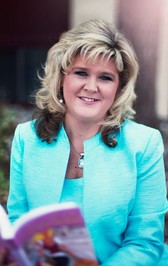
GIVEAWAY! 
Golden Cord of Light
-- EXCERPT: A dark shadow moved somewhere above them. Morisa looked up, thinking it was an animal or perhaps a guard who’d followed them. The shape left the cliff top and came flying down toward Baymond. It happened so fast she didn’t have time to react. The being landed on Baymond and they both fell to the ground. Baymond’s head slammed against a rock and he lay still. The other figure, a man, rose and turned to her. In the moonlight, Morisa’s knees weakened as she stared at the huge man before her. His cold eyes held dark power and she instantly knew he was a sorcerer. She moved past her fears and readied herself for battle. His fist flew toward her face. She twisted aside and slammed her heel into his gut. He gasped, doubling up, and she kneed him in the chin. Her robe hampered her movements as she dodged away from him. He came after her and dealt her a forceful kick, sending her sliding across the rocky shoreline. She rolled with the fall, then sprang up and defensively put her fists in front of her face. The sorcerer sent out a blast of psychic energy that knocked her to her knees. The spell held such power that she couldn’t escape. In agony, she focused on breaking his incantation. Her whole body began to feel hot as she chanted a counter spell. When her power hit his spell, they both flew backward. Trembling, Morisa rose and pulled her crystal out of her pocket. She held it in front of her, calling upon its energy. Before she could activate it, the sorcerer hit her wrist. The crystal flew out of her hand and onto the sand. He slammed his fist into her temple and she collapsed onto the ground. She rolled onto her stomach, trying to ignore her throbbing headache as she searched for her crystal. He kicked her in the ribs and her side exploded in pain. A cold chill went through her — this was a real fight, not a match. Her life and Baymond’s depended on her skills and training. Morisa expected to be struck again as she hunted in the dark for her crystal. Instead, she heard movement behind her. Glancing up, she saw Baymond had regained consciousness and fought the sorcerer. She turned her attention back to her search and spotted a gleam of violet light where the moonlight touched her crystal. She crawled forward and grabbed it, then drew on its healing energy to give her strength. Still weak, she looked back toward Baymond and watched the fight in fascination. Baymond moved with a grace, skill, and fluid control she’d rarely seen. He fought on a level beyond mind and body. His strength radiated out from the center of his being as he delivered forceful blows. The sorcerer’s foot slammed into Baymond’s chest and the youth staggered backward, barely retaining his stance and breathing raggedly. He looked like his body couldn’t withstand much more abuse. Blood flowed from a wound on his forehead and dripped into his eyes. He wiped it aside and blocked another kick, then slammed his fist into the sorcerer’s throat. A killing blow if delivered with enough force, but with Baymond’s declining strength it only knocked the sorcerer to the ground. As he fell the sorcerer stuck out his leg and hooked it against Baymond’s. The youth fell to the sand, landing hard enough to knock the wind out of him. The sorcerer was instantly on him and closed his hands around his throat. Baymond struggled frantically to pry open the man’s hands. Morisa concentrated on the power of the crystal. The psychic powers surrounding them had caused it to turn black in her hand. She visualized the crystal clearing as she called on the Lady Mother for help. Soon, she felt vibrating energy and the crystal glowed violet again. She pointed it toward the sorcerer and sent out a beam of light. The sorcerer cried out in agony as if he’d been stabbed in the back, then he collapsed across Baymond. The crystal’s power sliced back into Morisa’s hand and went through her being like a bolt of electricity. She collapsed. When she regained consciousness, she saw Baymond’s anxious face above her. “Get up quickly,” he said in a rasping voice. When she pushed her blistered hand against the sand to rise, she winced in pain. The sorcerer stirred next to them. Baymond grabbed Morisa’s arm and pulled her to her feet. “Let’s get out of here!” The sorcerer also rose, standing between them and the pathway up the cliff. He raised his hands in the air, drawing on dark powers. “Get to the ocean. Swim back,” Baymond yelled. When she hesitated, he said, “Run! Now.” 
GIVEAWAY! 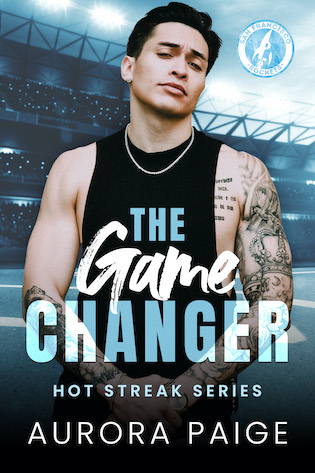
The Game Changer
Goodreads / Amazon / Barnes & Noble -- EXCERPT: There was a knock on the door and then Alaric strolled through the doorway. I sat behind my desk, needing some barrier between Alaric and me. He was like a magnet, and I gravitated to him—which was dangerous. Alaric’s gaze met mine, then he paused for a moment. He shook his head and flashed his perfect, white smile. “Now who’s hiding?” he said teasingly. “I don’t know what you mean,” I huffed out. “Celine, you can lie to yourself, but don’t lie to me. Your fear is as transparent as the blouse you were wearing the first time we met.” His gaze never left mine. I pretended not to feel my cheeks burning. “Look, people think I’m a goody two-shoes, and they’re right. I never broke the rules—” I tried explaining to him. “Well, I’m something of a bad boy and I could definitely teach you about breaking the rules.” He winked and a mischievous grin curved on his face. “Come to the dark side, Celine.” “I can’t.” I needed to stand my ground. It was difficult though when he was only a couple feet away from me. He looked sexy as fuck, even when wearing the most casual of clothing. His voice sounded sensual, and his eyes captured me. “You can. All it takes is one kiss,” Alaric said confidently. “I know that you want to kiss me as much as I want to kiss you. You can’t deny the connection we have—I’m positive you felt it to the moment we met.” 
GIVEAWAY! 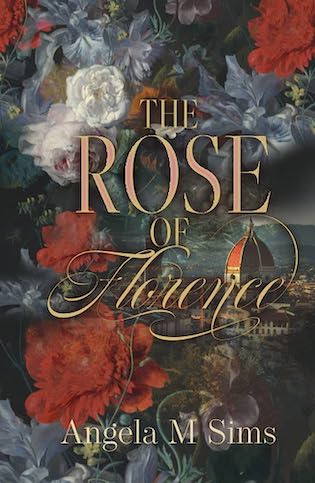
The Rose of Florence
Goodreads / Amazon / Barnes & Noble / Kobo -- EXCERPT: Setting the scene: Matteo is a manservant in Palazzo Rosini, and Cesare Conti is a guest at the family banquet that night, but clearly, they have come across each other before… Matteo remained behind to make sure that all the guests’ cloaks were hanging neatly and away from the fire, so that they didn’t smell of smoke by the end of the evening. He hadn’t noticed a figure standing quietly behind him until he heard a slight cough. Turning round, he almost bumped straight into Cesare Conti. He had been half expecting this but had hoped to avoid a direct conversation with him. “Signor Conti,” he said, with a small bow. “Can I help you?” “Oh, I think you have already helped me enough, don’t you?” The young man’s piercing green eyes looked directly at Matteo. Then, as if the sun had come out, Cesare broke into a beaming smile and put his arm around Matteo. “I just wanted to thank you…for last week. What a coincidence that you should be passing, just as I was leaving that place.” “I have to pass it occasionally when I am running errands for Eleonora. What goes on there is no concern of mine, ser.” Matteo was uncomfortable and hoped that was the end of the conversation. He made to move towards the stairs, but Cesare’s grip tightened. “We are grown men…er…” “Matteo, ser.” “We are grown men, Matteo. Women serve a purpose from time to time. Indeed, some are very beautiful, but some of us also have other needs, which must be satisfied. Sadly, the city looks on some of those needs as vices, the “Florentine vice”, I believe some call it.” He shook his head, sadly. “Whatever the rights or wrongs of the situation, I could have been arrested that day. You could have turned me in to the guard, and the life I have now would have been over. But you didn’t, and I wondered why.” “It’s none of my business, ser. As I said, I pass that place often, and who I see going in or coming out is no concern of mine.” Cesare raised an eyebrow. “I suspect you hold many secrets, Matteo.” He paused, as if deciding his next words carefully. Then he shone his beaming smile at Matteo. “Thank you, Matteo. Your discretion is noted and appreciated. I…” He paused, “…won’t forget it.” With a last glance, Cesare turned on his heel and bounded up the stairs to the dining room. 
GIVEAWAY! 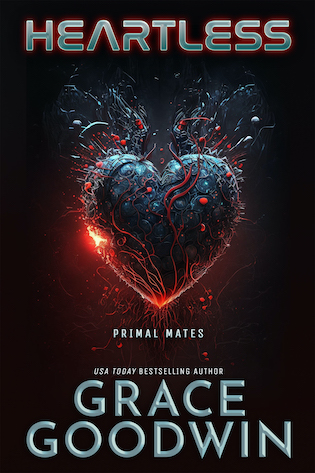
Heartless
-- EXCERPT: Oh, heck yes. I was ready for lots of mind-blowing private time with two hot mates. Sooooo, ready. My body had been willing for a while. My mind had taken its sweet time catching up. Now every part of me was fully on board. Heart. Mind. Body. Two mates? So very, very naughty. I squirmed, just a bit. I couldn’t keep the restless need from escaping. I hadn’t been touched by a man in so long. I tried to recall the last time—before the—before that. I couldn’t remember clearly, but I was pretty sure it had been years. “The transport window is closing, my lady. If we wait much longer, I will need to delay your departure.” The Prillon warrior in control of the transport pad interrupted our long goodbye. “Of course. So sorry.” I gave Makayla one final, super-tight hug, and walked up the few stairs to join my soon-to-be transported suitcase so we could be flung across the galaxy. The officer nodded, his large hands moving competently over the controls. Would my mates touch me with that level of intense concentration? Were their hands that big? That skilled? What was wrong with me? I was thinking like a horny teenager. “Are you ready, my lady?” The transport officer had kind eyes. He knew where I was going. And why. I nodded. The hum of the transport pad rose up from the floor like an electricity bath. The extra energy building up for my jump through space made me squirm like a shelter puppy about to be released from its cage. Finally free. Oh, yes. I was ready to meet my new mate. Commander Zarren Helion. Even his name sounded formidable. I just knew he was going to be one hundred percent perfect. *** Commander Zarren Helion, Intelligence Core, Black Fleet, Sector 438 The Prillon warrior sitting before me bled from multiple wounds, none fatal, each strategically placed to inflict maximum pain. Lieutenant Oberan Arcas of Prillon Prime. I have to break him. 
GIVEAWAY! 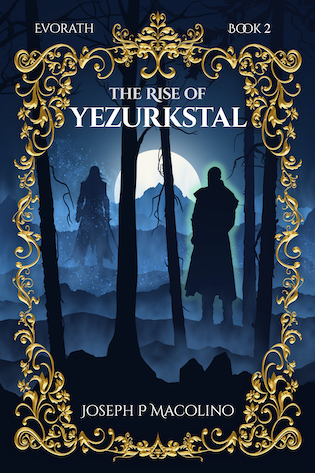
The Rise of Yezurkstal
-- EXCERPT: Artimus squeezed Savannah’s hands, gazing adoringly into her sweet eyes as the priestess spoke. “…And after this day, these two shall no longer be separate individuals, but instead are to be united as one. As they embark on their journey and enter into a new life, they must learn to act as one. Evorath has blessed us with all that we could desire, and now these two shall become one and bless one another with all they have…” Some of the smoke from the incense crept past his nose, causing Artimus to turn his gaze downward and squelch a cough. The smell of pine filled his nostrils as he cleared his throat and returned his attention to Savannah. “…Like a seed planted in fertile ground, the connection that is established today will still need to be nurtured and cared for. Love must act like water. Trust, like sunlight. Commitment, like compost. Only by truly accepting one another can these two spirits be joined in matrimony.” Artimus noticed Savannah’s smile expand, her eyes glimmering with excitement. He could not help but reciprocate, a foolish grin coming over his face. “So, Artimus Atyrmirid, will you devote yourself wholly to this woman, protect her, love her, and provide for her?” “It is Evorath’s will and mine as well. She shall be of my own flesh.” Artimus felt as if he was observing himself as he incanted these words, a tangible excitement running down his spine and filling him with energy. “And Savannah Sylvanas, now to be Savannah Atyrmirid, will you devote yourself wholly to this man, support him, love him, and bare his children?” “It is Evorath’s will and mine as well. He shall be of my own flesh.” Savannah looked as if she might burst with excitement as she spoke, her voice higher pitched than usual. “And so it is, and ever shall be. Once Evorath has willed it, it cannot be unwilled.” The priestess spoke with force now, her voice booming throughout the clearing. “Henceforth, Artimus and Savannah Atyrmirid shall be united as one. Through times of abundance and times of scarcity, they will have a bond beyond the physical realm. Their spirits are intertwined and shall remain as such for all eternity. Let everyone bow their heads now and observe the song of Evorath.” The bard in the east continued playing the harp, the melody of his tune slowing to a modest rhythm. He played four consecutive notes in a simple meter, progressively moving from a low pitch to a higher one. This simple melody continued for a few measures before the western bard pulled out a wooden recorder and joined in. Tapping his foot to the rhythm of the first bard, the woodwind player started with a soft and calming melody. Each note worked to propagate the romantic atmosphere. Like most aspects of the ceremony, this traditional song was simple but effective, the soothing melody instilling a palpable feeling of love and commitment. Artimus stood cradling Savannah’s hands, peering deep into her eyes. The entire crowd stood listening in silence, affected by the contagious feeling of bliss. Artimus could feel his skin tingling as if he was being influenced by magic as the music rose in intensity, the recorder playing louder and more pronounced notes. After the crescendo, the music lulled back into a soothing tone, a feeling of completeness overcoming him. Artimus was not a musician, but as he stood watching tears of joy well up in Savannah’s eyes, he felt a connection to the music. Though he had heard this wedding song a few times in the past, it was different experiencing it from the center. This was a day he had been awaiting, and this song signified that the wait was over. 
GIVEAWAY! 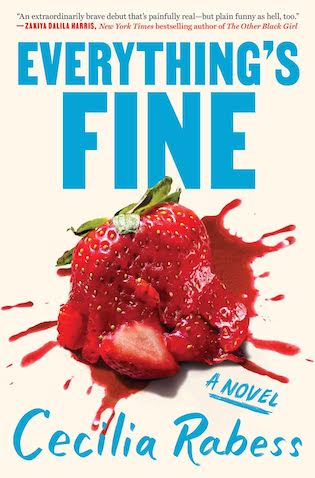
Everything’s Fine
-- EXCERPT: Chapter 11 Jess’s first day of work, the first day of the rest of her life. Into the elevator and up to the twentieth floor, where the doors open with a little whoosh. The entire building smells like money. She receives a small plaque with her name printed in all caps: JESSICA JONES, INVESTMENT BANKING ANALYST. Then mintroductions—the other analysts on the team: Brad and John and Rich and Tom, or maybe it’s Rich and Tom and Brad and John—and also Josh, who Jess remembers from college. “Hey,” she says, “it’s you!” He looks up from his desk—he is already installed at a workstation, looking busy and important—but his face is blank. They had a class together last year and Jess remembers him, because he was the worst. “Jess?” she offers. “From school?” He nods—the back of his head—“I worked with these guys when I was here last summer. And I graduated off-cycle, so I’ve been back since January.” He pauses. “They asked me about you.” “What did you say?” The first time Jess met Josh, it was fall of their freshman year. November. The night of the 2008 election. All day the campus had pulsated. History in the making. Around eleven the election was called and Jess emerged stunned and delirious onto the quad, which had erupted into something like a music festival. Students spilled out into the night cheering and hugging. Car horns honked. Someone screamed woot woot and, somewhere, a trombone, brimming with pathos, played a slow scale. Jess had the feeling she had been shot out of a cannon; she was blinking into the moonlight when a couple of reporters from the school paper stopped her. They were compiling quotes from students on the eve of this historic moment. Did she have a minute to share her feelings, and would she mind if they took her photo? Jess said sure, even though the air was crackling and she wanted to weep. The reporter’s pencil was poised. “Whenever you’re ready.” What could she possibly say? There were no words. “I’m just… I’m just… fucking ecstatic! Is this even real? And now I’m probably going to go have, like, thirty shots—no, fifty!—because that’s more patriotic!” The student reporter looked up from his mini legal pad. “End quote?” “Wait, no! Don’t write that!” Jess thought about it, collected herself. Imagined her dad reading her words. Her dad, who she’d spoken to just hours ago, and whose reaction to the early returns—Ohio and Florida were set to break for Obama—was to pour himself another Coke and say: “Well, Jessie, I’ll be darned.” She started over. “I feel the weight of history tonight. To cast my very first vote for our nation’s very first Black president is such an awesome privilege. A privilege that my ancestors, slaves, did not share. Standing on the shoulders of so much strength and sacrifice, I’ve never felt more humbled or hopeful.” “That’s great,” the reporter said. “Now just stand over there and we’ll take your shot.” Jess took a step to the left and watched as the reporter approached another student. A sandy-haired freshman wearing chinos and a collared shirt. The photographer said to Jess, “Look this way. On the count of three.” And the reporter said to the boy in business casual, “How are you feeling about the election?” Jess turned to the camera and smiled. The guy in chinos turned to the reporter and said, “Everyone seems to forget that we’re in the middle of a financial crisis. The stock market is in free fall. Gas is four dollars a gallon. So I’m not convinced that now is the right time to entrust another tax-and-spend liberal with the economy,” he shrugged, “but I guess I can see the appeal.” Jess, aghast, turned to give him a dirty look, her smile dropping just as the flash popped. The next day she was on the front page of the school newspaper under a headline that read STUDENTS REACT TO OBAMA’S HISTORIC WIN. The picture was good—the angle, the moonlight, her face radiating quiet wonder—and that, plus the gravitas of the moment, made Jess feel like this was something she would show to her children and their children one day. There was only one problem. The paper had spoken to ten students, a grid of two-by-two photos and quotes, names and graduation years printed below. But there were only two faces above the fold. There was Jess, but also the guy in the collared shirt, with his terrible quote. Jess’s friends agreed that it was a stupid thing to say. Miky, who lived across the hall, said, “Who pissed in his Cheerios?” And Jess’s roommate, Lydia, peered at the photo and declared: “He looks boring.” Still, Lydia tacked the paper to the outside of their door. With a marker, she drew a frame of hearts and stars around Jess’s face. But there was no way to accordion the paper so that only her picture appeared. It cut off the text strangely and warped her smile. It was impossible to see Jess without seeing Josh. Eventually Miky took a Sharpie and drew devil ears and a weird mustache across his face, and that was better. Eventually the tack hardened and the paper fluttered to the floor. At that point it was the spring semester and the hallway had devolved into a persistent, low-grade chaos: crushed pizza boxes, twisted extension cords, a mysterious pair of men’s underwear. And when the cleaning crew cleared out the dormitory between the spring and summer sessions, they swept everything, including that momentous reminder, into the trash. But until that happened, Jess could return to her room each day and see the newspaper, like a talisman, stuck to her door, emanating strength and inspiration, and when she looked at it, she would think: We are standing at the precipice of a bright new world, hopeful and resolute, knocking on the door of progress, with the conviction of what’s on the other side. And then she would slide her eyes to the right, to the photo of JOSH HILLYER ’12 and his terrible quote, and she would think: Asshole! Brad and John and Rich and Tom’s and Josh’s desks are all arranged in a tight semicircle around a dirty carpet in the center of the room. In the bullpen, they are packed like sardines, swimming in pitchbooks and gym bags and coffee cups, so there is no space for Jess. “We’ve got you over here,” Charles says. He is the most senior associate on the team, and Jess can tell he’s in charge because he wears his tie the loosest and calls everyone by their last name. Even more senior is Blaine, the team’s managing director, but he can’t be bothered to meet her. Charles leads her to a row of desks along the wall. By now, after the all-day orientation, it’s after five, but the office is still buzzing. Still, the seat that Charles points to and all the ones that surround it are empty. The desks, though, are covered in equipment, telephones and Bloomberg Terminals and digital handsets. Traders, Jess guesses. Traders are the first ones in and the first ones out. When the market closes their day is done. Jess feels a tingle of excitement. The traders are loud and potty-mouthed and wear hideous pinstripe suits. The investment bankers, on the other hand, are nasty but humorless. Jess might have liked to be a trader but had missed the deadline to apply. Maybe this is a sign, an opportunity. She imagines herself shouting orders into a phone, telling someone to go fuck themselves when she doesn’t like a price. “So this is where the traders sit?” Charles blinks. “No, not exactly.” “Then what’s with all the telephones?” “Switchboard,” Charles says. “Secretaries and stuff. You know, ‘Goldman Sachs, how may I direct your call?’ Switchboard,” he repeats. “Secretaries.” “Oh.” By the end of her first month, Jess can say How may I direct your call? in four languages and she still hasn’t been assigned any real work. Her back is to the bullpen, but whenever she looks over, the other analysts appear to be chained to their chairs, heads bent over their desks, doing God’s work. Jess is doing nothing. It doesn’t help that when the bankers shout for coffee orders or someone to run to the copy shop, they do it in her general direction: a secretary is a secretary, even when she’s actually an analyst. Just yesterday a harried-looking senior associate asked her to pick up a suit from the dry cleaner’s downstairs. “Oh, I’m actually an analyst.” “I don’t have time for this,” he said, handing her his bright pink ticket. “Look, can you just help me out?” She said she couldn’t, but then hid in the bathroom for fifteen minutes so that he wouldn’t see she had nothing else to do. Jess begs Charles for something to do. She reads an article about women and work. It says: “It is incumbent upon females in male-dominated workplaces to create their own opportunities for development.” She says to Charles, “It is incumbent upon females in male-dominated workplaces to create their own opportunities for development.” He squints. “And so I was hoping you could help me. Create an opportunity? Like, give me something to work on?” Miky sends Jess a link to a video of Nicolas Cage superimposed on a teenage girl’s body, wearing white panties and a tank top, swinging from a giant cement wrecking ball. Jess clicks on it. “Should be pretty straightforward,” he says, flipping through one of the books. “If you log in to the server, you’ll see we’ve already got a template. I just need you to tune the model and run a few different comps. Got it?” “Got it.” Jess eyes the stack of books. “When do you need this by?” Charles says, “Yesterday.” It doesn’t occur to Jess that she has no idea what she’s doing until it’s too late to ask for help. The only person who offers is Josh, though not because he actually wants to help, but because he is her buddy. On her second day he appeared at her desk. “Hey, Jess.” She spun around so that she was face-to-face with his waist. “Josh, hey.” “I’m your buddy,” he said. “Excuse me?” she said, to his belt. “Your buddy,” he said. She pumped the lever on the side of her chair and dropped three inches in her seat. Her face was still uncomfortably close to his crotch so she stood. “So what does that mean? You’re my buddy?” “I’ve been assigned to help you. To answer questions if you have them,” he shrugged. “They try to pair every first-year analyst with a second-year analyst, kind of like a mentor. They picked me for you. Probably because we’re from the same undergrad.” “But you’re not a second-year analyst.” “Close enough,” he said. “Anyway, I’m here.” And then he walked away. Now every night before he leaves, if it’s before she does, he asks if there is anything she needs help with. But he’s always holding his phone and his bag and wearing his jacket, and his corporate badge is already in his pocket, so that Jess can tell he doesn’t mean it. It’s just something to say and, anyway, her desk is right next to the elevator. Of course she needs help, has questions. How is a debt capacity model different from a credit risk analysis? How does the federal funds rate affect LIBOR? How come her key card doesn’t work at the gym on the first floor? But he is the last person she wants to ask. She can tell he thinks she’s an idiot, that she doesn’t belong here. She catches him sometimes, looking at her sideways. Interested but unimpressed. Like he’s waiting for her to mess up. Plus, he’d already made his feelings clear. That class they’d had together senior year: Supreme Court Topics. Each week they debated a different landmark decision, and someone was always shouting. Or sharing a pointless personal anecdote. Or invoking the founding fathers to prove a stupid point. Jess hated it, but it fulfilled the undergraduate Law & Society requirement. They sat around a big wooden table that was meant to foster “active dialogue,” and the discussion was student-led, the format purposefully discursive, so that even if one day, for example, the syllabus said Grutter v. Bollinger: Affirmative Action, they might spend half the class arguing about basketball and standardized tests until someone groaned: “Is anyone else completely bored of this debate?” It was the guy from Jess’s door, JOSH HILLYER ’12, who cared about the price of gas and hated Barack Obama. Who Jess had managed to avoid since freshman year, but who had reappeared three years later. Still with the newscaster hair and the terrible takes. Jess had turned and glared. Not because she wasn’t also bored of the debate, but because she knew he was bored for the Wrong Reasons. He’d said what he said on the front page of the school paper, but it wasn’t just that: it was everything about him. His Choate sweatshirt, for example, which made Jess think of lawns and regattas and gin cocktails and haughty blondes. And there was something about his face. It had been there in the school paper, that something, but the effect was more pronounced in real life. He looked like what a fifth grader might come up with if asked to draw a man, all even lines and uncomplicated symmetry. Square jaw, blue eyes. Like someone to whom life had been incredibly kind. Like a guy from an old sitcom who condescended to his wife. “It’s 2011,” Josh had argued, “why are we still having this debate? How does throwing open the doors to elite universities fix discrimination? The problem is broken homes and blighted communities. That’s where policy interventions should start. In homes, in neighborhoods, in schools.” “This is a school,” Jess had pointed out. “Sure,” Jess replied, “because my college application was just the words ‘I’m Black’ repeated one thousand times.” Someone else clarified, “I think his point is that we shouldn’t take race into account at all.” “Exactly. Affirmative action isn’t fair.” “It’s not meritocratic.” “It’s not constitutional.” “It is kind of outrageous that there’s essentially a double standard based on, you know, melanin.” “What about the double standard for athletes and legacies!” Jess’s heart was pounding; she felt a little wild-eyed. “Isn’t that the outrage?” She searched the room—for what? For someone who might agree with her? That wasn’t going to happen. They would make their dispassionate arguments, and when class was over they would calmly pack their textbooks away and Jess would be the only one who’d felt like she’d been kicked in the teeth repeatedly. She took a breath. “My point is just that anyone with a squash racquet or a trust fund is automatically exempt from scrutiny. No one’s asking if they’re qualified. Why?” “That’s not the same thing, and you know it.” “Yes, it is.” The professor cleared his throat. “Let’s bring it back to the case at hand. Was Grutter’s claim valid? Or was the court’s decision, on balance, unconstitutional?” Jess sighed and sat back. He whispered, “Is that really your argument? That legacies and affirmative action are the same thing? I mean… really?” Jess had ignored him and pretended to pay attention as someone prattled on about why it didn’t make sense for universities to “lower the bar.” Josh slid his elbows over the table so that his clasped hands rested on Jess’s notebook. So that she could smell the fabric softener on his sleeves. “Come on,” he had said, his voice low. “I don’t believe you believe that.” Jess had picked up her pen, drawn a series of squiggles and spirals in the upper right corner of her notebook. Avoided eye contact. “At least you see how it’s a false equivalence, right? You do see that, don’t you?” All Jess saw was his pale wrists, the titanium watch ticking silently. His father had probably given it to him on his eighteenth birthday. Along with a fifty-year-old bottle of scotch and the passwords to all the brokerage accounts. Jess didn’t reply. He leaned closer. “So you really think relaxing admissions standards for ‘underrepresented minorities’?”—here he used air quotes, which confirmed for Jess that, yes, he was the worst—“is an acceptable mechanism by which to achieve”—more air quotes—“?‘equality?’?” This was why Jess hated Law & Society. It was always the same story: oppressed peoples, willful misrememberings of history, a whiff of white supremacy. Unlike calculus or economics, in which the professor silently scratched out the answers at the front of the lecture hall, and in which there was rarely controversy—unless someone got started on infinity!—in these liberal arts classes people insisted on shouting out their opinions, no matter how unseemly. It was a lot to endure for a couple of college credits. Yet here she was. And there he was. Breathing. Staring. Forcing her to engage. Emanating smug entitlement. Waiting. “So you really believe that having a certain skin color is as good as possessing some demonstrable skill or talent?” He shook his head. “Seriously?” Why couldn’t he just go polish his watch and leave her be? But he wouldn’t let it go. He kept shaking his head, saying, “I don’t believe you believe that,” until Jess said: “Josh?” He leaned toward her, expectant, and Jess tugged her notebook from under his wrists. “You’re on my notes.” He seemed momentarily startled but was undeterred. “You realize you’re essentially arguing that ‘diversity’ matters more than merit.” She was losing patience. “Well, you’re arguing that swinging a squash racquet is equivalent to four hundred years of slavery and systemic inequality!” Around the table conversation stopped. Everyone looked over. It occurred to Jess that she wasn’t exactly whispering, wasn’t even really using her indoor voice anymore. The professor frowned. “Jess? Did you have something to add?” This always happened: She got sucked in. When she would rather say nothing, just sit quietly playing number puzzles on her phone under the table. At the same time she accepted, begrudgingly anyway, that it was her responsibility to Say Something. This Jess had learned from her father, who, throughout her Nebraska childhood, seemed perpetually to be saying something. Demanding that the Walmart manager stock multicultural dolls while Jess stood behind him, mortified. Driving across state lines at Christmas to find the only Black Santa in the Great Plains. Pestering the principal about the lack of books about Black history in the school library. He was doing his best, Jess knew. Compensating, probably, for the fact that her mom had died when Jess was a baby. But sometimes she wondered why he bothered. Wouldn’t it have been easier to move? Instead of yelling at her teachers for fucking up the Civil War unit? Or buying knockoff Barbies? All she had wanted was to fit in, not to read another children’s biography of Dr. Martin Luther King. Not to have to whisper-fight with Josh, in his prep school sweatshirt with his newscaster hair; not to have to defend herself, her race, her right to be there. Later that night, at the bar where everyone went, he tracked her down and dragged her back into the conversation. It was nine o’clock and everyone was drunk. Avenue Tavern had sticky floors and a sign above the door that said FREE BEER TOMORROW. Fifteen dollars and a fake ID bought twenty-five-cent well drinks all night long. Jess had drunk cranberry vodkas until she ran out of quarters and when the room started spinning she found an empty booth near the bathroom. She had only been there for a minute when she felt a depression in the fabric. A body next to hers. She had opened one eye, cocked her head slightly. “Jess, right?”—it was him—“Josh,” he introduced himself, formally, sticking out his hand. She ignored it, closed her eyes again, hoping he’d go away. Jess said nothing, slid a little bit lower in her seat. Josh ignored her ignoring him, pressed on. “As a direct beneficiary of affirmative action I see why you’d want to defend it. I get it, I do. But you can’t really believe, I mean intellectually not emotionally, that relaxing admissions standards is an appropriate mechanism by which to address systemic inequality. Sending kids to schools that they’re not qualified to attend? That’s helping? Besides, it’s completely unenforceable. I mean the real problem with inequality in this country has nothing to do with race, right? It has to do with class. How is it fair that a rich African American kid with mediocre grades and test scores gets preference over some poor kid from Appalachia who’s had even less in life?” “So, you’re asking me, the expert”—Jess finally opened her eyes—“why we don’t have affirmative action for poor white people?” He nodded. “I mean that’s fairly reductive, and I sense some sarcasm, but yes, I’d like to hear your thoughts.” “My thoughts are”—she took a sip from her drink, melted ice that tasted of metal—“fuck you.” He shook his head. “It’s like pulling teeth, trying to have an honest intellectual conversation with anyone at this school.” “Maybe you’d be happier at Appalachia State.” “Funny,” he said, and got up. “Here.” He pushed a glass of water at her and Jess had to make an effort not to say thank you. “So,” he said, one arm slung over the banquette, “what are you doing next year?” “What?” “Really? You don’t have anything lined up?” Jess shrugged again. “Maybe a nonprofit that does something with kids. Or an art gallery.” That was her roommate Lydia’s plan. Rent an apartment in the West Village or Brownstone Brooklyn and take taxis to her full-time internship at Christie’s in Rockefeller Center. “A thing with kids? An art gallery?” Josh shook his head. “Those aren’t real jobs.” “Okay, well, not everyone wants to grow up to be Gordon Gekko, yelling at their secretaries and raiding pension funds just to buy more caviar and purebred dogs. Some of us would actually like to give something back.” “Give something back? With a forty-thousand dollar salary?” “Funny,” she said, “I didn’t realize everything was about money.” Jess wanted to believe this more than she actually believed it. Wanted to affect a casual relationship with money. To seem like she could take it or leave it. She didn’t want to seem too hungry. Or desperate. Or striving. None of her friends wanted jobs in finance. They wanted to volunteer, to seek fulfillment, to make art. And why not? They were right. Money didn’t matter. Unless you didn’t have any. “I’m curious, that’s all. Is it because that’s what your friends are doing? I thought you were different.” “Different from what?” “From your friends.” It was true that in many ways Jess was different from her friends; from Lydia, who had attended a boarding school in the Alps where they broke at noon for cheese and chocolate and whose father was the president of a Swiss bank. Or from Miky, who wasn’t a member of the Korean royal family but who seemed like she could be—she had a way of insisting that she wasn’t that made it seem somehow truer. But they had been friends since freshman year and it rankled Jess to think that her efforts to obscure those differences had failed, and that some guy at a bar, in a pink shirt, would call it out. “What do you mean different?” “Not an art gallery girl.” “I’m sorry.” Jess was taken aback. “Do you know me?” “Don’t be defensive,” Josh said. “Some of us had to work to get here. Some of us will have to work after we leave. I’m guessing that’s you too.” “You don’t know anything about me. You think just because I’m Black I’m poor? How enlightened.” “Well, I mean statistically, that’s the reality. It’s just numbers. But that’s not what I was saying. It’s something else. You seem…” He stopped, searching for the right word. Involuntarily, Jess leaned toward him. “I seem…?” He ran his finger around the rim of his glass. It whistled, low and melodic, like a whale. “Keen,” he said finally. Keen? Keen? Jess would have been less offended if he’d told her she smelled like hot garbage. “Josh?” she pointed across his lap. “Yeah?” he said, but didn’t move. “I’m leaving.” She pushed past him out of the booth, spilling both of their drinks as she did. At the bar, Lydia was ordering another round. “Who was that?” she asked, handing Jess a shot. “He’s cute! Are you going to bone?” Jess tipped her head back and the icy liquid burned. She let a wave of nausea pass through her and then wrinkled her nose. “You don’t recognize him?” “Should I?” She taps her computer and it hums to life. She hopes to impress, or intimidate, him with complicated numbers and figures that appear on-screen. But he immediately recognizes what she’s doing. “A precedent transaction analysis?” He leans over Jess, pecks at her keyboard and flips through various documents on her desktop. He narrates each document as he goes: “Discounted cash flow, balance sheet, cost of capital.” He looks at Jess. “So what’s the problem?” “I don’t know.” He looks at her screen. Toggles back and forth between the various spreadsheets. His face is just inches from hers. He smells like store-brand soap and Altoids. “Do you even know what you’re doing?” “That depends on how you define ‘know’ and ‘doing.’?” “Christ,” he says, wheeling over the chair from the desk next to Jess’s. He sits. “Where are you calculating the discount rate?” He is keying over the cells of Jess’s spreadsheet; his fingers dance over the keyboard like a pianist’s. “Here.” Jess points to the screen. “This is wrong.” “You need to take the weighted average cost of capital”—he picks up a public information book from her desk, pages through it, picks up another and turns to the appendix—“from here”—he points to a number on a page, grabs a yellow marker and highlights it—“and then use that to drive the model assumptions”—he points to the screen—“here. See?” She nods. “Here, scoot over.” He rolls his seat toward her and pulls the keyboard into his lap. “Do you know how to set up dynamic named ranges?” She shakes her head. “Christ.” He is a little hostile, but also patient, like a German schoolteacher. And eventually it gets done. She sends the model to Charles first thing in the morning and immediately receives a response: “Come see me.” Jess flies over to his desk. He is leaning back in his seat, one leg crossed in a triangle over the other, bouncing a rubber band ball against the corkboard wall. The model is open on his computer. “You rang?” He swivels toward her. “What is this?” “It’s the model you asked for.” Jess stops herself from saying more. “Calibri?” “Um.” “This isn’t a fucking humor magazine. Next time you use Arial. Or Times New Roman if you’re feeling fresh.” He snaps a single rubber band just over her shoulder. “Got it?” Jess finds Josh in an empty conference room. “Thanks again for your help last night,” she says. He ignores her, just keeps scrolling through his phone. Jess says, “No ‘You’re welcome, Jess’? No ‘Happy to help, Jess’? No ‘Anytime, Jess, what are buddies for’?” “I had plans,” he says, still staring at his phone. Jess wonders if she’s offended him, wonders if she cares. Implying that someone is a Republican is not an insult, not technically. Especially not at a bank. But he definitely is, Jess is pretty sure. In their Supreme Court class he was always talking about fringy economic things, like payroll taxes and public debt. Once, she’d run into him at the school bookstore and watched him pay for a pack of gum with a hundred-dollar bill. “Funny.” He picks up his phone again. “Well,” Jess says, headed for the door, “for what it’s worth, I do actually appreciate your help.” Outside, the city is teeming with new college graduates, everyone looking to have a good time. It’s late August, and the hot sticky heart of the summer has passed, so it feels like spring. It reminds Jess of college, when the entire student body emerged from the gray winter in short shorts and plastic sunglasses and dragged couches out onto front lawns. Sometimes they would cut class, Jess and Miky and Lydia, and sit on a patio drinking sun-warmed beer and spicy margaritas until their heads would spin. But that’s all over now. Their new friends, the Wine Girls, are sunny California optimists with trust funds and tangled hair whose parents grow grapes in the Napa Valley, who believe in free love and acupuncture and private space travel and electric cars. Jess meets them one night, when she sneaks out of work at a reasonable hour. The bar slash restaurant is dark and loud, and in the heat of the crowd Jess feels nostalgic. She finds them all sitting at a small table crammed with cocktails and tall glass bottles of sparkling water. Everyone screams hello and then the Wine Girls shout over the music, “Why are you wearing a suit?” Jess sits down and shout-explains that she works at Goldman Sachs. “It’s not that bad,” Jess shrugs. “Not that bad! Goldman Sachs is the great vampire squid!” the Wine Girls insist, “attached to the face of the economy, sucking it dry!” A waiter materializes. “Ooh,” Lydia lights up, “should we order the squid?” The Wine Girls inform Jess that, given her hundred-hour workweek, she’s essentially making minimum wage, less, probably, than she would slinging burgers at a fast-food place. This is not true, obviously, and more importantly, working at McDonald’s doesn’t come with the imprimatur of the most powerful and important bank in the world. Or the begrudging respect of people who might otherwise write her off. Or black car rides home every night. But the Wine Girls aren’t completely wrong; Jess kind of hates her job. It’s boring, and no one is nice to her, and all the midweight wool makes her itch. She barely sees her friends, barely sleeps, barely eats anything that doesn’t come in a take-out box. When Lydia asked, Jess complained about life on the front line. “Lyd, it’s awful. It’s just a bunch of dudes, in suits, doing shit and saying shit. All day. Every day.” “Well,” Lydia said, “the patriarchy wasn’t dismantled in a day. At least there’s no line for the ladies’ room.” This was not the case in Lydia’s own office, a boutique auction house, where two-thirds of the employees were women and where the toilet was always clogged with tampons and glitter. Jess fantasizes constantly about a different job. Like Lydia’s job at the auction house, which can be demeaning, but has a decidedly glamorous air. Or like the Wine Girls: Callie, who works at a cookie dough startup, and Noree, who works at an eco-first company that makes shoes out of recycled bamboo. Even Miky, who’s an account coordinator for the world’s biggest creative advertising agency, is still home by six every day. It would be nice: a fake job and a nice apartment and parents who pay the bills. Instead: student loans, a studio that eats up half her salary, people always and forever looking at her sideways. Jess’s dad calls. “Well,” he asks, “are you giving ’em hell?” She knows what he wants to hear. That she’s showing up early and leaving late; that she’s beating them at their own game. Growing up he’d said it again and again. She needed to be twice as good to get half as much. He was right, she knew, but she resented it. Why did her success have to be predicated on perfection instead of, say, a vague sense that she was someone people would like to have a beer with? Still, she tries. To keep up, to keep her head down, to make herself useful. Even though she’s not sure anyone notices. And while she’s definitely better than Rich, who graduated from Harvard but still can’t spell Wednesday, it’s not clear that she’s better than Josh, who can do a discounted cash flow with his eyes. She considers telling her dad the truth: that she feels like a baby sometimes, needy and helpless. That she is the only one at a loss, the only one who doesn’t have a strong opinion about The Things That Matter: the price of soybeans, the nuances of Glass-Steagall, the new menu at the University Club. But she can hear him smiling, waiting, on the other end of the line. 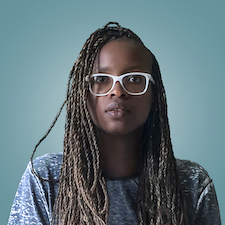
GIVEAWAY! #Book Blitz #The Substitute Sister by Katherine Nichols #Psychological Thriller @Xpresso Book Tours14/7/2023

The Substitute Sister
-- EXCERPT: I’m one of those people who reminds everybody of someone else. Strangers approach me to ask where we met before and are disbelieving or disappointed when I explain we haven’t. If questioned about what I do for a living, I say surveillance and flash a mysterious look, an expression I’ve practiced in the mirror hundreds of times. I tell them my work is classified, which is more of a misdirection than a downright lie. My actual job is with a temp agency because Natalie Burden is a temporary kind of girl. I am in the espionage business, though, in a highly specialized capacity. But I never divulge my area of expertise. Because if I did, I would have to admit to them and myself that an agent with only one person of interest is less spy and more stalker. 
GIVEAWAY! |
Archives
May 2024
Categories
All
|

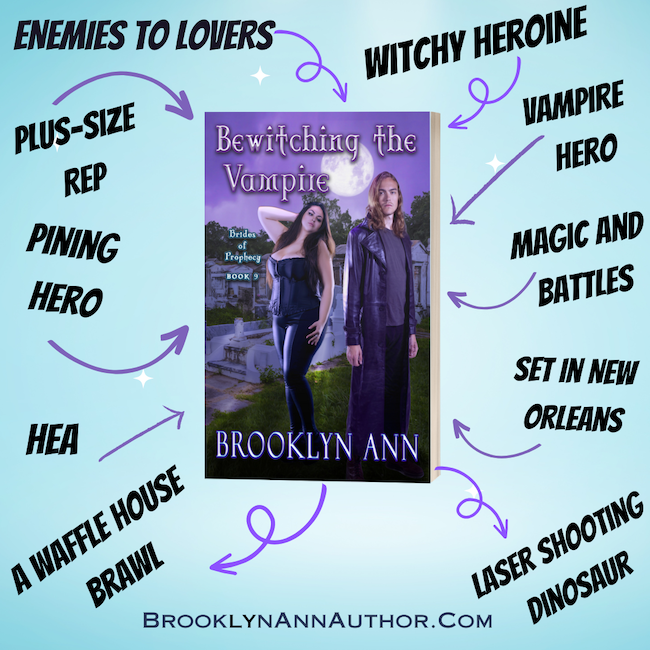


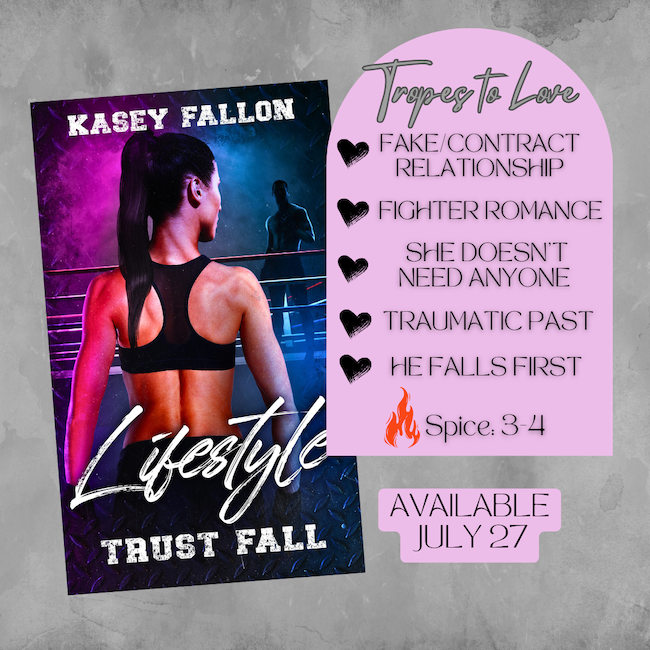



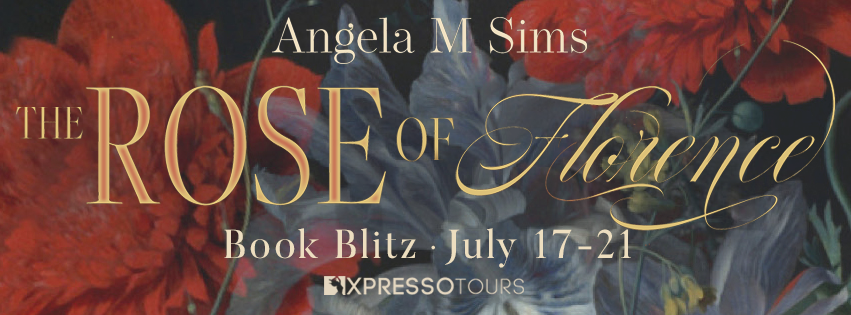

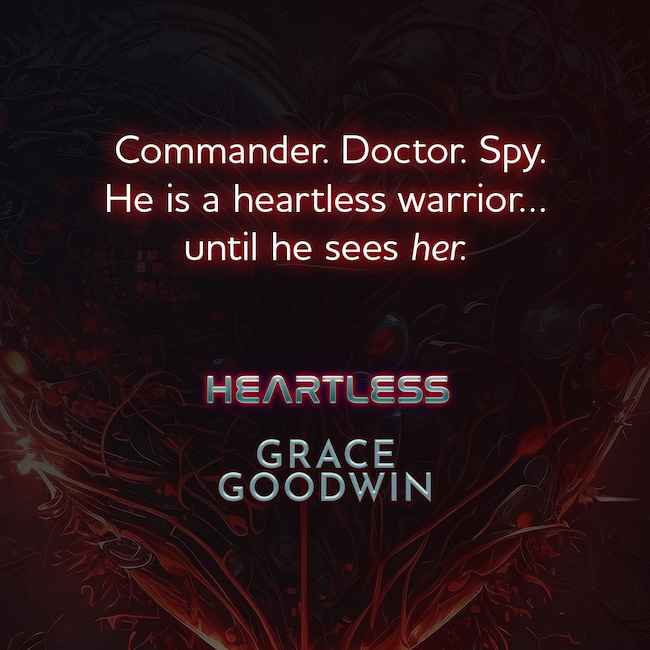
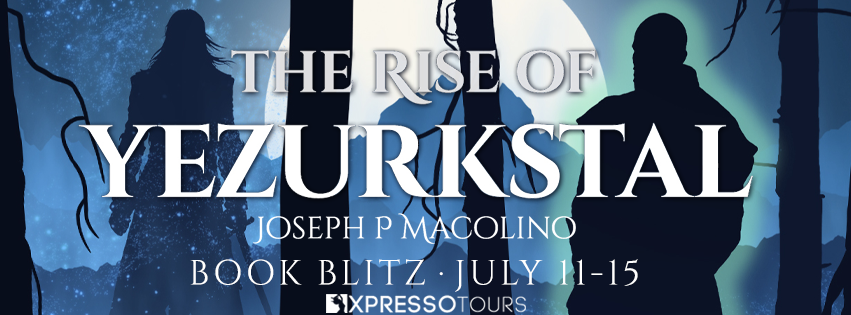
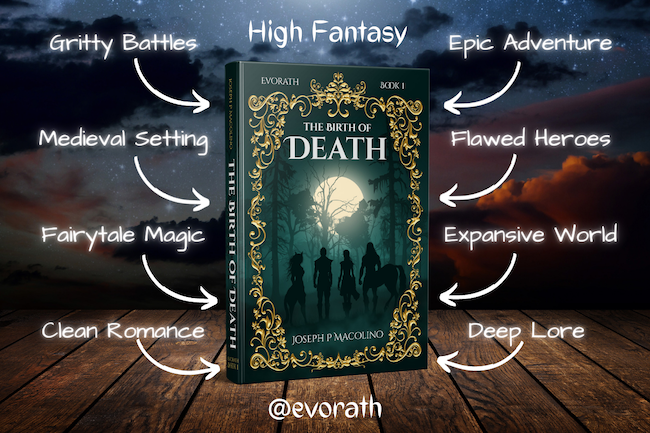


 RSS Feed
RSS Feed
